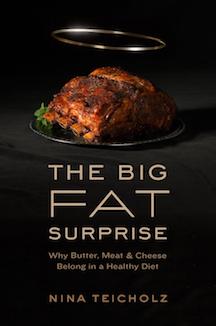By Jay M. Pasachoff
The content of this book could be very significant. Journalist Nina Teicholz examines decades of research on nutrition and, for me, makes a convincing case that much current wisdom about the effect on heart health of eating fats vs. eating carbohydrates is based on inadequate science. She describes how scientist Ancel Keys decades ago (his name is associated with K-rations, the World War II military unperishable meals) was so influential that the anti-fat diet adherents held sway, diminishing the role and even the funding of scientists who reached other conclusions, preventing ongoing scientific research that could have given valid answers long ago. President Eisenhower’s heart attack, and the anti-cholesterol position of his doctor, Paul Dudley White, based on Keys’ ideas, led to a firming up of anti-fat sentiment, on the grounds that eating fat led to fat in the arteries which, in turn, led to heart attacks. We now know that that sequence is not, in fact, true. (I like the photo of Keys, White, and others touring the Crete ruins of Knossos; Keys, while citing the overall diet of the long-lived people of Crete, ignored the fact that one of his sampling period occurred during Lent, when they were not eating their normal diet.)
Teicholz summarizes that “…every plank in the case against saturated fat has, upon rigorous examination, crumbled away. It seems now that what sustains it is not so much science as generations of bias and habit….” She sees obesity as a metabolic disorder, not as a direct result of normal eating or under-exercising.
Teicholz favorably cites the earlier publications of journalist Gary Taubes, who has written about the role of insulin in storing fat and also concluded that the demonization of dietary fat has been excessive. Taubes has also written about the roles of salt for blood pressure (the blood pressure of only a small percentage of people is sensitive to salt) and of sugar in human consumption. He has implicated—as Teicholz now does—the increase in sugar consumption (both refined sugar and high-fructose corn syrup) in obesity, rather than consumption of dietary fat. Teicholz quotes Taubes citing research that “obesity was indeed a hormonal defect and not the result of gluttony and sloth.”
I am reminded of the current fad for low-gluten or gluten-free products, becoming more and more widespread even though only a minuscule fraction of people (maybe only 1%) have the disease that sensitizes them to gluten. Perhaps people misassociate “gluten” with “glycemic index,” a measure of the response of the body to sugars. High-glycemic-index foods such as those with refined sugar led to peaks in insulin and can lead to type-2 diabetes. It seems to me that the general public health of more people would be better promoted by listing “low-glycemic-index” products instead of (or in addition to; why not?) “gluten-free” products.
The nutrition field is very controversial—and as a consumer I would like to see and to understand valid conclusions based on science. I haven’t checked the over 120 pages of notes and bibliography; the text of this 479-page book ends on page 337. It strikes me that in the field of nutrition discussed here, there is too much back-and-forth based on entrenched interests rather than science. I like to read about the scientific method being cited and used to test hypotheses. Teicholz’s book seems to me to be an important contribution to the ongoing debate.
Astronomer and author Jay M. Pasachoff is the director of Hopkins Observatory and Field Memorial Professor of Astronomy at Williams College. He is a Visitor in the Planetary Sciences Department of Caltech. Williams College is home to the Gamma of Massachusetts Chapter of Phi Beta Kappa.




